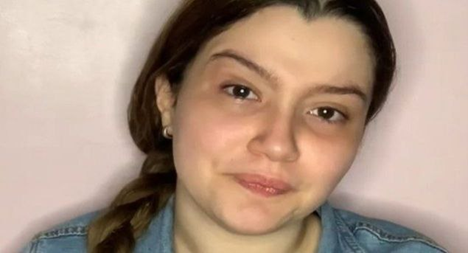
Haneen Hossam, one of the “TikTok girls” has pleaded not guilty to human trafficking charges in an appeal hearing at the Cairo Criminal Court
Haneen Hossam, one of the so-called “TikTok girls”, pleaded not guilty to bogus human trafficking charges in an appeal hearing in front of the Cairo Criminal Court Tuesday, the latest example of the Egyptian state cracking down on women’s freedom of expression.
Hossam was sentenced in absentia to 10 years behind bars last year. She faces a hefty 200,000 Egyptian pound ($10,977) fine. Authorities alleged she trafficked two young women under the age of 18 by encouraging them to join a video-sharing platform for financial gain.
While Haneen Hossam was also previously charged and sentenced for “violating family values,” a court overturned that sentence in early 2021.
Her defense team pointed out that the case against Hossam is completely reliant on police investigations given that the alleged victims in the case did not accuse Hossam of exploiting or trafficking them and the prosecution has no evidence or witnesses.
Despite these indicators of a fundamentally unfair trial, a sentence is expected at Hossam’s next hearing, set for April 18.
Hossam, a Cairo University student who has about 900,000 followers on TikTok, was first arrested in April 2020 after posting a video inviting her female followers to join another video-sharing platform, Likee, telling them that they could make money by broadcasting videos on it.
Prosecutors later charged her with “violating family values and principles”.
15 Human Rights organizations
Fifteen human rights organizations, including the Association for Freedom of Thought and Expression (AFTE), Electronic Frontier Foundation (EFF), and the Tahrir Institute for Middle East Policy (TIMEP)
in mid-May 2021 called on Egyptian authorities to stop trials of TikTok content creators and to guarantee freedom of expression
The fifteen human rights organizations condemned the continued prosecution and trial of TikTok and Likee content creators, demanding that the Egyptian authorities stop these trials, release these defendants, and close these cases.
The organizations also stressed that the authorities should ensure the right to freedom of expression, including on social media, without arbitrary restrictions.
On 14 March 2021, the Public Prosecution referred TikTok influencers Haneen Hossam and Mawadda al-Adham to trial on human trafficking charges.
Last January, the Cairo Economic Appeals Court cleared Hossam of the charge of infringing on family values. Meanwhile, it annulled the prison sentence initially issued against Al-Adham in the same case, but upheld a fine of 300,000 pounds that she was ordered to pay.
In 2020, 11 defendants were referred to trial for posting content on TikTok and Likee. They include eight content creators, a page admin, and two Likee employees. Seven of the defendants are still in prison; four of them remanded into custody pending trial and three of them serving jail terms.
In September 2020, a prison sentence was issued in absentia against content creator Manar Sami. The trial of content creator Renad Emad is still ongoing, and the case of content creator Passant Mohamed is still open and pending investigation. The police are still looking for content creator Hannen Hossam.
The human rights organizations affirmed that such trials reflect the Egyptian authorities’ hostile attitude towards citizen free use of the internet.
According to the rights groups, these trials show how authorities are seeking to monitor social media accounts through the police and the Public Prosecution on the pretext of protecting family values. They attempt to do so based on Article 25 of Law No. 175 of 2018 on Combating Information Technology Crimes, which violates the constitution and contains vague terms that criminalize the right to freedom of expression.
The initial case involving Hossam and Al-Adham and the charge of infringing family values was marred by a number of violations during the arrest and investigation period; both defendants were targeted not because they violated the law, but because of what they represented as women exercising their right to free expression.
Even prior to trial, the Public Prosecution issued statements in which it treated the defendants as guilty without solid legal evidence.
This human trafficking case involves the prosecution of both women for activity that is practiced around the world and that is a part of what it means to be a content creator on social media: the management of social media pages to display visual content and obtain financial compensation as follower numbers increase.
In the case files, police investigations attempted to describe this content creation as human trafficking.
The rights organizations renewed their call for the Egyptian authorities to stop these trials, including the human trafficking case against Hossam and al-Adham, and to release the defendants who continue to be held in pretrial detention or who have been sentenced to imprisonment in connection with these cases.
The organizations also called on authorities to guarantee freedom of expression, including on the internet, and to stop employing the vague provisions of the Law on Combating Information Technology Crimes to infringe on digital rights.



